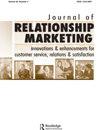基于群体行为分析的社会网络模型——旅游产品与服务购买支持
Q2 Business, Management and Accounting
引用次数: 0
摘要
摘要企业和组织的主要沟通模式之一包括理解哪种沟通方式是最好的,以及每种类型的内容对数字生态系统中共存的不同世代的影响。旅游业是该行业对这一生态系统最敏感的行业之一,因为如今,旅游决策过程的所有阶段都主要以数字方式进行处理。产品是在数字平台上进行研究、传播和获取的。本文利用社交媒体分析了不同世代潜在游客在搜索有关旅游产品的商业和详细信息时的在线行为。根据体验经济理论编制了一项调查,并通过社交网络在网上传播。提出了一个社交网络用户体验模型SNUX 2.0,用于分析不同世代用户的体验,将社交网络作为寻找旅游产品和服务信息的媒介。使用SmartPLS 3.0的结构方程建模来分析所提出的模型。该研究得出结论,社交网络有助于影响不同世代的购买意愿,主要是当商业信息对所有世代都具有教育性质时,根据消费者的世代,伴随着不同的维度。本文章由计算机程序翻译,如有差异,请以英文原文为准。
SNUX2.0: A Social Network Model for Cohort Behavior Analysis as Support for Purchasing Tourism Products and Services
Abstract One of the major communication paradigms for corporations and organizations consists of understanding which is the best format in which to communicate, and the effect that each type of content has on the different generations that coexist in the digital ecosystem. Tourism is one of the industry’s most sensitive to this ecosystem, as, nowadays, all stages of the travel decision process are mainly processed digitally. Products are researched, disseminated, and often acquired on digital platforms. This paper uses social media to analyze the online behavior of potential tourists from different generations when searching for commercial and detailed information concerning tourism products. A survey was prepared based on the experience economy theory and disseminated online through social networks. A Social Networks User Experience model, SNUX 2.0, was proposed to analyze the experiences of users from different generations, associated with the use of social networks as a medium through which to find information about tourism products and services. Structural equation modeling using SmartPLS 3.0 was used to analyze the proposed model. The study concluded that social networks can contribute to influencing the purchasing intent of the different generations, mainly when commercial information has an educational nature for all generations, accompanied by different dimensions depending on the consumer’s generation.
求助全文
通过发布文献求助,成功后即可免费获取论文全文。
去求助
来源期刊

Journal of Relationship Marketing
Business, Management and Accounting-Marketing
CiteScore
10.20
自引率
0.00%
发文量
7
期刊介绍:
The Journal of Relationship Marketing is a quarterly journal that publishes peer-reviewed (double-blind) conceptual and empirical papers of original works that make serious contributions to the understanding and advancement of relationship and marketing theory, research, and practice. This academic journal is interdisciplinary and international in nature. Topics of interest (not limited to): Evolution and life cycle of RM; theoretical and methodological issues in RM; types of RM, networks and strategic alliances; internal communication, quality, trust, commitment, satisfaction, loyalty, and dissolution in RM; applications of RM in different disciplines and industries; international perspectives in RM; RM strategies in services economy, higher education, and e-commerce; RM, technology, and the Web; profitability and RM; case studies and best practices in RM. If you are interested in becoming an ad-hoc reviewer, please e-mail a brief statement indicating your area of expertise and interest along with a copy of your CV.
 求助内容:
求助内容: 应助结果提醒方式:
应助结果提醒方式:


